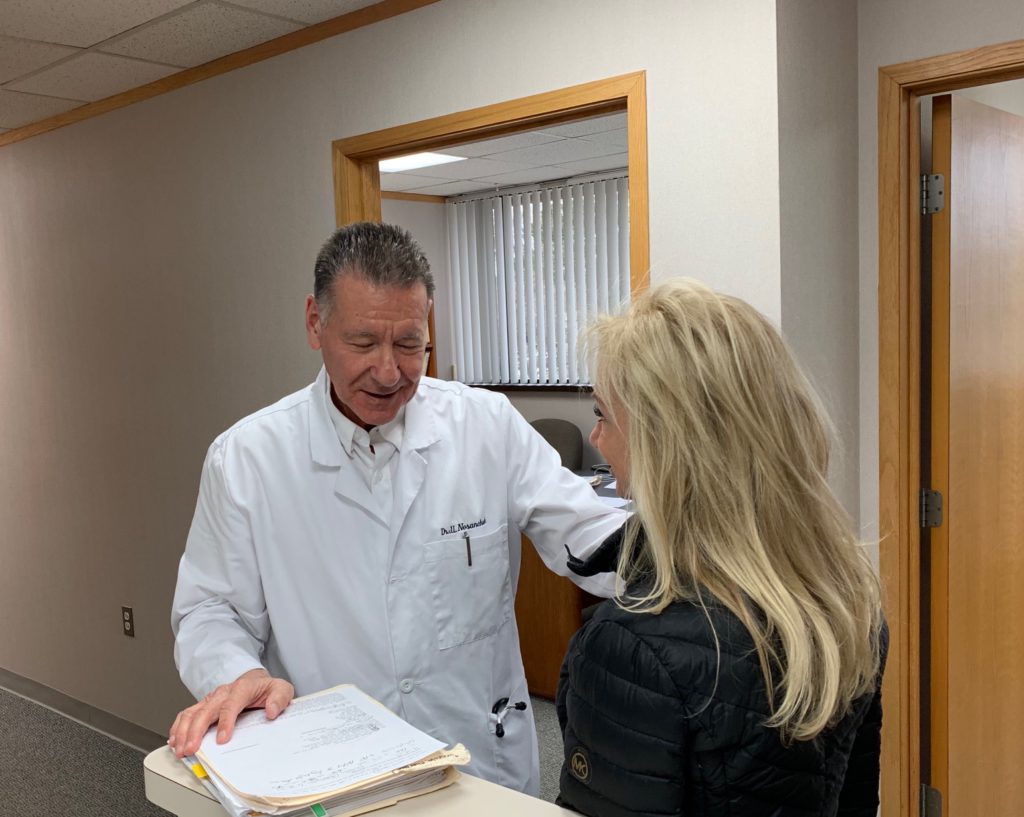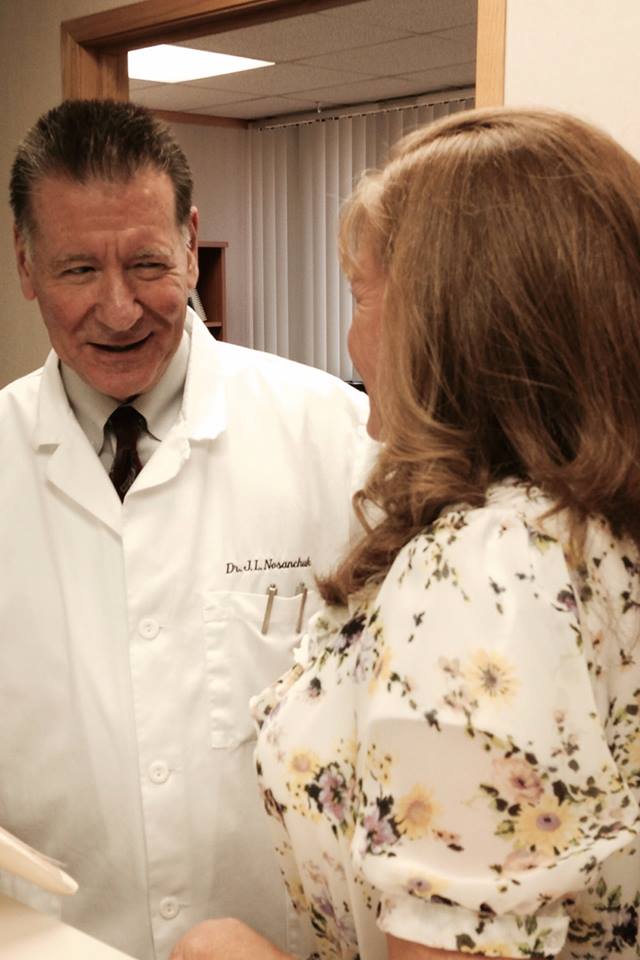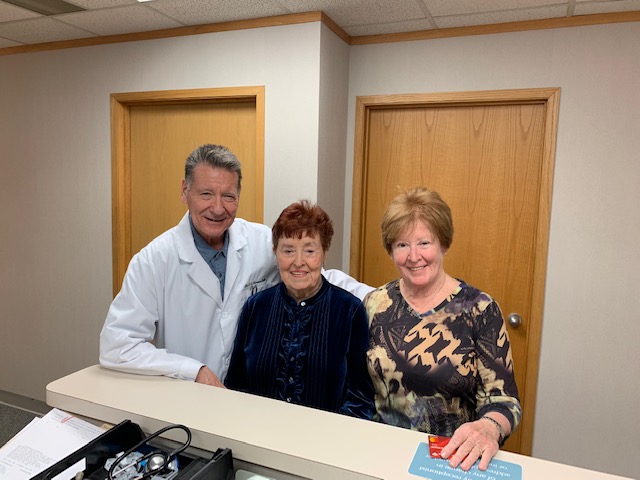Look younger, avoid wrinkling, prevent hair loss and have a great sex life
Dr. N provides natural hormone regimens for both women and men including hormone pellet implants that keep you looking years younger, restore your sex life, resolve hot flashes, sweats, sleep disturbances, headaches, fatigue and depression. To schedule an office or virtual visit call (248) 644-7200

Hair loss in women of any age can be devastating. The societal image of the attractive and desirable woman includes a full and lush head of hair. Even discovering a mild increase in the number of hairs in her bathtub can result overwhelming sense of panic.
What causes hair loss in menopausal women?
Prior to menopause the majority of are afforded protection from hair loss by her naturally circulating estrogen levels. In theory the protective mechanism is related to the estrogen in the hair follicle blocking the conversion of testosterone to its more potent form dihydro testosterone. After estrogen levels fall that protective effect is lost. Following the birth of a baby a woman has dramatic fall in her estrogen level and her fall in estrogen level is almost certainly the mechanism of the hair loss experienced a few months after the delivery that occurs in some women. If a woman who has never had a problem with hair loss begins to lose hair following menopause it would be a reasonable consideration to replace her estrogen levels. From a rational standpoint it should be her first consideration.
What causes hair loss in women before menopause?
The precise cause of the hair loss is unclear, but in majority of cases appears to be genetically determined and is an inherited alteration in the way individual hair follicles metabolize the sex hormone testosterone. This type of hair loss is known as androgenetic alopecia or genetic balding. Almost all women experiencing this type of hair loss have normal hormonal function including, normal testosterone levels, normal menstrual function and fertility. Affected women are believed to undergo a higher rate of conversion of testosterone to its more potent form dihydro testosterone (DHT). The higher level of DHT in the hair follicle is believed to be the mechanism responsible for the hair loss. While most assume balding is a male problem it occurs about equally in both sexes, affecting 50% men and 40% of women by age 50. The hair loss experienced in women is usually milder and begins between the ages of 12-40 years of age
Do I need to see a doctor if I am having some hair loss?
Hair loss in menopausal women is perceived uniquely by the individual woman experiencing it. Nonetheless, in some it is capable of negatively impacting self-esteem and quality of life. Every woman affected should address the problem in the manner she feels is most appropriate for her. However, it is important for women with hair loss to be evaluated by a physician who is knowledgeable about in this area for instance a dermatologist or an endocrinologist.

.
Are there non-inherited forms of hair loss in menopausal women?
Women who do have abnormally high levels of male sex hormone may also experience thinning of scalp hair. Signs of abnormally high levels, include an increase in body, or facial hair especially if appearing in a masculine pattern of distribution, severe cystic acne, abnormal menstruation, breast secretions and clitoral enlargement. Women who are experiencing these problems should speak to their doctors about a referral to a physician who is experienced in diagnosing and treating these problems.
Additional problems that have been associated with hair loss in menopausal women include anemia, thyroid disorders, syphilis, fungal infections, connective tissue diseases such as Lupus, hormone secreting tumors, significant weight loss and stressful life events. alopecia areata, a condition of localized balding is considered by many to be an auto immine disease. Traction alopecia is a form of hair loss associated with excess traction on the hair either during styling, or by habitual tugging by the woman herself.

What about poor scalp circulation and clogged hair follicles?
Women concerned about their hair loss are easy prey. Commonly used explanations for hair loss put forth by those selling over-the-counter remedies for hair loss, such as poor scalp circulation and clogged hair follicles have been found to have no role in hair loss. To my knowledge these products are of no benefit.
Can medication cause hair loss?
Treatment with cancer chemotherapy is well known to be associated with hair loss. Medication-related hair loss is not fully understood, but thought to be due to a disruption of the normal phases of hair growth. The hair loss may be reversible when the medication is discontinued. One research study evaluated the reasons and rates of removal of subdermal levonorgestrel implants (Norplant) a medication used for contraception. Among those desiring removal, hair loss was cited as the reason 13.6% of the time. Medication-induced hair loss is an occasional side effect of antidepressants and other psychoactive drugs. In these cases stopping the medication usually results in regrowth of the lost hair. Other medications that have been implicated by some in hair loss include cholesterol lowering medication, oral contraceptives and blood thinners.
Testosterone replacement at appropriate levels is rarely associated with hair loss, but may be a factor in some susceptible women. Women who experience this problem, but would like to continue to use testosterone replacement because it enhances their quality of life and sexuality may find that adding the spironolactone a medication with mild diuretic properties will lessen or prevent the problem.
Hair Loss Treatment Options
Topical minidoxil solution (Rogaine) is FDA approved for the treatment of hair loss in women with androgenetic alopecia. Finasteride (Propecia), is presently the most effective medical treatment for men. Given orally at prescribed doses it promotes hair growth and prevents further hair loss in a significant proportion of men with androgenetic alopecia. It is thought to work by inhibiting the conversion of testosterone to DHT. Although some research suggests it is effective for this type of hair loss in women it is not FDA approved for this use because of a known risk of fetal malformations. Regardless, some physicians currently use it in women who are not at risk of pregnancy. Spironolactone as discussed above has been used with success in some success. The rationale for its use is based on the belief that it interferes with the ability of androgens to bind to the receptors in the hair follicle thereby not allowing DHT to exert its effect.
If a form of treatment is found to be effective it should be continued indefinitely assuming there are no negative side effects, or advised to do so by a knowledgeable physician as stopping the treatment results in a return of hair loss.
Hair replacement surgery is an option for some women. The best candidates for this type of treatment should have areas of dense hair growth at the back or sides of the head available for transplantation. Women in whom a medical or surgical approach is not effective, not feasible, or not desired may choose to use a wig, or hair extensions.
Menopause Overview
This page defines and discusses menopause, surgical menopause and premature menopause…
Menopausal Symptoms
A woman may experience a number of changes in the way she feels at or prior to menopause. We call these changes the “symptoms” of menopause. This page defines and discusses menopausal symptoms and their treatment…
Sex and Menopause
Loss of sexual desire and ability to participate in and enjoy sex is not a normal part of aging. Dr Nosanchuk explains why a menopausal woman’s desire to have sex and her capacity to physically participate in sex are both affected by her menopause…
Menopause & Weight Gain
Dr Nosanchuk discusses the factors that influence weight gain in menopausal women…
Menopause & Migraine
This section discusses the nature of migraines and its relationship to menopause and hormone levels. In addition it provides strategies that may reduce the number and frequency of headaches…
Dr. Jerry Nosanchuk is a practicing physician who has specialized in the care of menopausal women for over 30 years. His office is located in Bingham Farms, Michigan. Appointments with Dr. Nosanchuk can be made by calling: (248) 644-7200 and speaking to Caroline Monday through Friday from 10AM to 6PM
IMPORTANT: This website is for educational purposes only. It is not intended to suggest a specific therapy for any individual and must not be construed to establish a physician patient relationship.